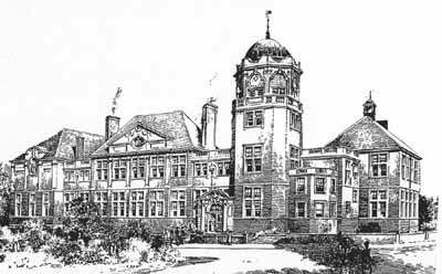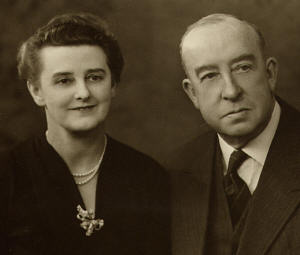In the wake of the death of intrepid veteran broadcaster Alistair Cooke, David Bridgeman-Sutton looks at one of the important early influences of this remarkable man's life.
Telegram from America
"Telegram from America, Sir: reply paid one thousand words".
|
The Blackpool telegram boy repeated the mantra-like phrase a score of times during the autumn of 1936. One can imagine a thrifty Lancashire telegraph supervisor shaking her head. She remembered Alistair Cooke ~ Alfred as he used to be called ~ and nothing the local lad, now in America, might do would surprise her. But Mr Curnow at the Grammar School ought to know better than to encourage such extravagance.
|
W. I. ("Billy") Curnow spent most of his life encouraging the young of Blackpool, though not, it must be said, in extravagance. As Second Master at the town's Grammar School, he devoted himself to preparing pupils for University entrance examinations — and those of Cambridge in particular.
In the 1920s, a University education was not high on the list of priorities of most pupils at provincial Grammar schools. Not every promising scholar responded to Billy's encouragement. One who did was young Alistair Cooke, whose arrival at B.G.S. coincided with Billy's return from war service in 1919. He attended the seminars, tutorials, mock interviews and other forms of preparation, routinely offered by Billy and his colleagues at Blackpool, but then rare elsewhere.
Cooke launched his career with a scholarship to Jesus College, Cambridge, followed by a Harkness scholarship to Yale and Harvard. His interest in the United States had been fostered by Billy's teaching of American History. In some of his broadcast Letters, he referred to the returned war veteran whose enthusiasm had fired his own.
Those telegrams, with which we started, were the result of events that led to the abdication of King Edward VIII in 1936. As a young journalist in America, Cooke had many opportunities to write and broadcast on the major topic of the time. The major topic in the US, that is — any mention of it in Britain was forbidden.
In the 1920s, a University education was not high on the list of priorities of most pupils at provincial Grammar schools. Not every promising scholar responded to Billy's encouragement. One who did was young Alistair Cooke, whose arrival at B.G.S. coincided with Billy's return from war service in 1919. He attended the seminars, tutorials, mock interviews and other forms of preparation, routinely offered by Billy and his colleagues at Blackpool, but then rare elsewhere.
Cooke launched his career with a scholarship to Jesus College, Cambridge, followed by a Harkness scholarship to Yale and Harvard. His interest in the United States had been fostered by Billy's teaching of American History. In some of his broadcast Letters, he referred to the returned war veteran whose enthusiasm had fired his own.
Those telegrams, with which we started, were the result of events that led to the abdication of King Edward VIII in 1936. As a young journalist in America, Cooke had many opportunities to write and broadcast on the major topic of the time. The major topic in the US, that is — any mention of it in Britain was forbidden.
Cooke's research into his stories was always thorough. Billy, one of whose strengths was Constitutional History, was an obvious and enthusiastic source on the issues of precedent, protocol, law and politics that had everybody confused on both sides of the Atlantic. Until space made this impossible, Billy kept the great pile of telegrams that had so shocked the postmistress, together with Alistair's letters and the signed copies of books that followed regularly.
|
Billy's second wife, Hilda, was a Blackpool contemporary of Cooke's. She gained a Scholarship to Cambridge and was awarded her BA in 1928 and her MA in 1933. In the course of a 40-year teaching career, she prepared many pupils for University entrance.
Together, Billy and Hilda attended every Cambridge ceremony at which a former pupil of one or other received a degree. It was a rare year in which at least one pupil did not. In Hilda's day, Cambridge women received their degrees by post, their appearance in academic dress within the city being forbidden! In her final year of teaching she joined the contingent from her old college, Newnham, and publicly received the award of MA for the second time. She observed that the degree certificate of 1974 was most inferior to that of 1934 both in paper quality and in penmanship. |
David Bridgeman-Sutton,
April, 2004
April, 2004
Picture captions/credits:
With thanks to Blackpool Grammar School for their kind help and permission to use the photo of the school above.
With thanks to Blackpool Grammar School for their kind help and permission to use the photo of the school above.



